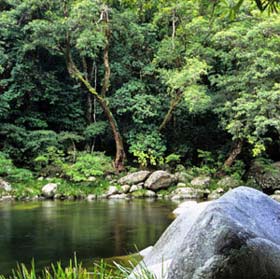Biodiversity economy
On Monday, environmental ministers around the world participated in a report looking for the economic value of the declining biodiversity on Earth.
Originating from last year's Stern report - a surprising data on economic costs due to weather changes, ministers now call for a similar study of the value of millions of species on the earth.
German environment minister Sigmar Gabriel said, a figure beyond the imagination of 150 species that are extinct every day is thousands of times faster than natural processes. However, at present, there is too little knowledge about these species and their value.
Biodiversity is not only the key to providing food through fertile soil as well as nutritious seafood, it also provides an additional gold mine for the pharmaceutical industry.

Queensland's Daintree rainforest is considered the world's oldest forest with a life of more than 135 million years, with many rare and endangered plants and animals.(Photo: iStockphoto)
According to the Potsdam Initiative, in a global study, we will launch a process of analyzing the global economic benefits of biodiversity, the costs of losing this diversity and Failure to implement protection methods goes against the cost of effective conservation.
In the meeting at Cecilienh at Chateau, this is also the place where the Potsdam 1945 treaty to restore Europe was discussed, with the participation of industrial powers G8 and 5 developing countries: Bazin, China. , India, Mexico and South Africa.
New ideas will be confirmed at the G8 summit in June.
Minister Gabriel presided over the last two-day meeting saying that biodiversity is not just as simple as the consideration and identification of birds but it is mentioned as an insignificant correlation. rarely politicians and economists pay attention to it before.
At the meeting, the ministers exchanged opinions on how to overcome the phenomenon of global warming, this is still a very difficult problem.
There are 13 countries accounting for about two-thirds of the CO2 emitted on Earth; Invisible gases absorb the sun's heat and threaten to destroy sensitive climate systems. of the planet
Negotiations will continue to follow the new framework after the Kyoto Protocol ended in 2012. However, the biggest challenge is to entice the US agreement and rigid commitments with developing countries. This is also the concern of the economic burden of technology transfer with clean and efficient fuel,
During the summit last week, the European Union of 27 nations promised to reduce greenhouse gas emissions by 20% by 2020 and more by 30% if international members approve.
Meanwhile, the US National Oceanic and Atmospheric Administration (NOAA) announced on Thursday that the Earth was at its hottest time from December to February compared to a similar time 128. year. And the peak of January around the world pushed the average temperature during this time to 0.72 degrees Celsius above the normal level compared to the 20th century.
On March 16, Japan meteorological authority also announced the first snowfall in Japan.
In European countries the temperature from December to February is also above the 2 o C average, indicating that the crops were planted a month earlier, the main products were soon present in the market, in addition to being active. They also migrated early, while others did not.
Anh Phuong
- Vietnam won the third ASEAN photo contest on biodiversity
- 'Must act immediately to protect biodiversity
- Towards a green economy, green energy
- Biodiversity: A balance between conservation and exploitation is needed
- World biodiversity hot spots: ASEAN
- Antarctica seriously degrades biodiversity when sea water heats up
- The first Vietnamese was honored with the ASEAN Biodiversity Hero
- Online security affects the whole economy
- Newton worked for the British economy
- Develop national biodiversity action plan
- The value of biodiversity for our common future
- Vietnam and South Africa jointly protect biodiversity
 Is the magnetic North Pole shift dangerous to humanity?
Is the magnetic North Pole shift dangerous to humanity? Washington legalizes the recycling of human bodies into fertilizer
Washington legalizes the recycling of human bodies into fertilizer Lightning stone - the mysterious guest
Lightning stone - the mysterious guest Stunned by the mysterious sunset, strange appearance
Stunned by the mysterious sunset, strange appearance